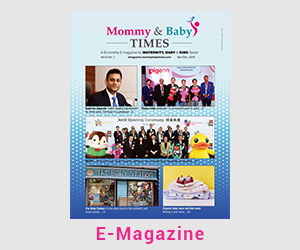Headquartered in Kowloon, Hong Kong; the Federation of Hong Kong Industries is the only statutory chamber established since 1960, aimed at empowering industries based in Hong Kong. Ivan Ting, Group 19 Chairman in Hong Kong Toys Council at Federation of Hong Kong Industries, in interaction with Mommy & Baby Times (MBT) presents his insights on the role of their organization in the promotion of the Hong Kong industries, and how the toy manufacturing scenario is going to transform in this decade with India to be considered as an alternative manufacturing hub.
March 11, 2020

Started in 1960, the ‘Federation of Hong Kong Industries’ is a business organization for the industrial companies based in Hong Kong established under the Federation of Hong Kong Industries Ordinance, as per the laws of Hong Kong. The primary objectives of the federation are to promote the interests of Hong Kong’s industrial and business communities, to encourage trade, investment, and to advise the government on policies and legislation which affect business. The Hong Kong Toys Council (HKTC) is a subdivision in the federation established in 1986 under the auspices of Federation of Hong Kong Industries (FHKI), which aims at promoting the interests of Hong Kong toys industry from both local and international perspectives.
Key objectives of the Hong Kong Toys Council
Outlining on the fundamental proposition of the Hong Kong Toys Council, Ivan Ting says “HKTC has been internationally recognized as an international organization for successfully creating a communication platform for local industry players and representatives around the world. We seek to increase awareness around international product safety standards in the industry due to increasing demand for higher product quality. Our council members are responsible for various committees of local and international bodies including the Toy Advisory Committee of Hong Kong Trade Development Council, International Council of Toy Industries (ICTI) and Asian Committee of Toy Industries. We also consult with the government with regard to safety issues and major concerns in the supply chain of toys industry.”
Elaborating on the role of the organization, he informs “HKTC is an independent statutory industrial organization that is thoroughly committed to encourage the progress of the local toy industry. Apart from maintaining efficient communication within the council, we also coordinate with different toys associations and councils around the world so as to be updated about the latest innovations, developments and key trends in the sector as well as to gain awareness about the major concerns in the market. Being closely associated with the International Council of Toy Industries, we seek to promote awareness around the toy safety standards.”
“we also coordinate with different toys associations and councils around the world so as to be updated about the latest innovations, developments and key trends in the sector as well as to gain awareness about the major concerns in the market.”
On being associated with the Ethical Toy Program of ICTI
Put in place in 2004, the ICTI Ethical Toy Program was started primarily to safeguard and improve ethical and sustainability standards in the global toy industry supply chain and is specifically designed for the toy industry. This program has some stipulations around labour and social standards in the toy industry such as legal fair pay, no forced or child labour, and better working conditions for the labourers.
Presenting a rundown on their association with the Ethical Toy Program of ICTI, he states “with our association with the IETP (ICTI Ethical Toy Program), we actively promote the idea of socially and economically responsible toys manufacturing which is fair and equitable to everyone. In making sure that our manufacturers are IETP certified, we also educate them on how to have a systematic and responsible manufacturing. We also present honest feedback to the ICTI Ethical Toy Program on the various challenges and concerns in the manufacturing sector, so, this is kind of a mutual and correlative coordination.”
“with our association with the IETP (ICTI Ethical Toy Program), we actively promote the idea of socially and economically responsible toys manufacturing which is fair and equitable to everyone.”
India as a potential manufacturing hub of toys
Factors such as an exponential rise in wages, increased production costs and have affected China’s competitive edge and stature in the manufacturing of toys. The toy manufacturers around the world are on a lookout for potential alternative manufacturing facilities besides China and India is a top consideration as it is continually growing in importance, status and scope as a manufacturing centre for toys.
Speaking on the Indian market and about the prospect of it becoming a leading manufacturing hub, he says “India is a growing market, and we definitely think that the Indian government is really progressive and agreeable with regard to the trade relations. With the other favourable factors such as the suitable age demographics and economical labour costs, the country certainly is extremely competitive and is being considered as a top choice to be a manufacturing hub by the toy makers around the world.”
With the ongoing US-China trade conflict has put a definitive increase in pressure on toy manufacturers and has accelerated the industry relocation strategy, aiming to move production to India.
“India is one of the locations that we are looking at because there is a huge potential in this market and a great manufacturing competitive advantage.”
Ting explains “there is a pressing need to diversify our manufacturing base, because of the trade tensions and increase in the Chinese labour costs. It will be a productive and efficient strategy to diversify our supply chain, and India is one of the locations that we are looking at because there is a huge potential in this market and a great manufacturing competitive advantage.”
Underscoring about the way forward, he affirms “the members of the Council are hoping to associate with the Indian companies and are willing to synergize and team up. The toy manufacturers of Hong Kong have a certain expertise in the production, while what they seek is a skilful management in accord with the standard business environment of India. Understanding the distinctive social and economic situations is a prerequisite in order to consider investing. In the recent past, a few Chinese companies have reportedly entered strategic alliances or Joint Ventures with their Indian partners to establish toy manufacturing units in India. From an investment perspective, I think that the Indian market has immense potential.”








